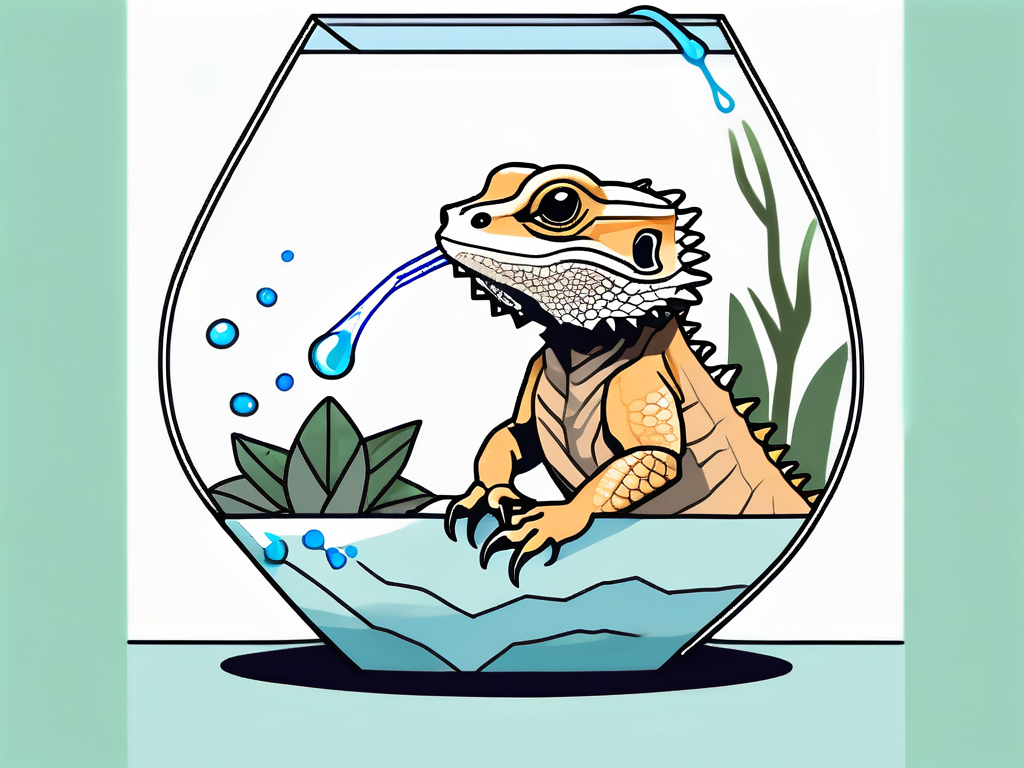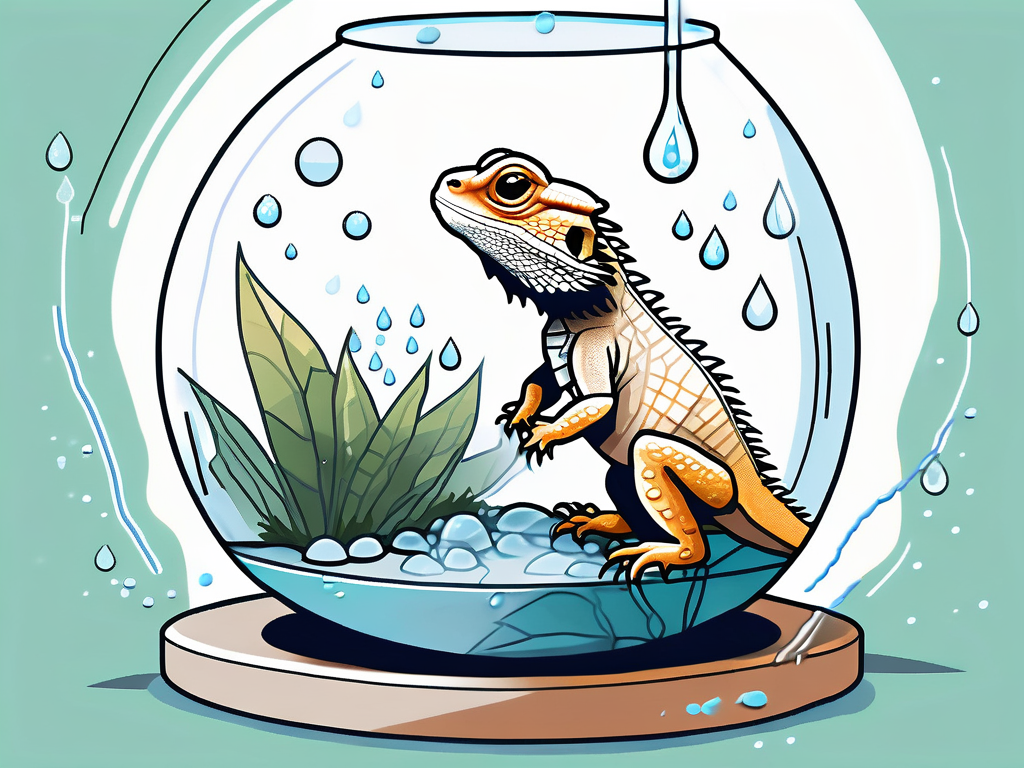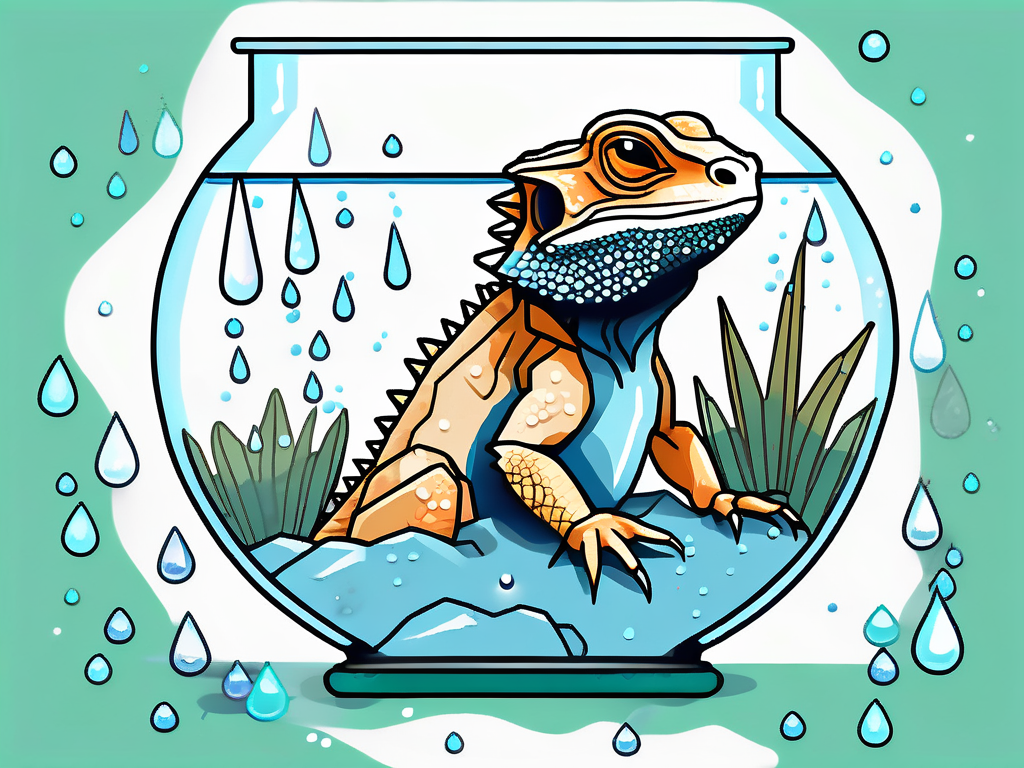Bearded dragons, also known as beardies, are fascinating reptiles that make popular pets. Like any pet, their well-being depends on meeting their basic needs, which includes providing adequate hydration. As a reptile species, bearded dragons have specific hydration requirements that owners should be aware of in order to ensure their health and well-being. This article will explore the importance of hydration for bearded dragons, factors that influence water intake, methods of water provision, signs of dehydration, how to prevent dehydration, and debunk common myths surrounding bearded dragons and water consumption.
Understanding Bearded Dragons’ Hydration Needs
Hydration is crucial for the overall health and functioning of bearded dragons. Water plays a vital role in various bodily functions, including digestion, temperature regulation, and organ function. Proper hydration is especially important for bearded dragons as dehydrated reptiles can suffer from serious health issues.

The Importance of Hydration for Bearded Dragons
Hydration is essential for maintaining healthy bodily functions in bearded dragons. It aids in digestion, lubricates joints, and helps regulate body temperature. Additionally, adequate hydration supports the functioning of vital organs, such as the liver and kidneys. Without proper hydration, bearded dragons can experience dehydration, which can lead to severe health complications.
Bearded dragons are native to arid regions and have evolved to conserve water efficiently. They obtain most of their hydration from the food they eat, such as vegetables, fruits, and insects. In the wild, bearded dragons will also drink water droplets off leaves or rocks after rain. As such, providing a shallow water dish in their enclosure is essential for captive bearded dragons to drink from and maintain proper hydration levels.
Factors Influencing Water Intake in Bearded Dragons
Several factors influence the amount of water a bearded dragon needs. One key factor is the bearded dragon’s age. Juvenile bearded dragons require more water compared to adults due to their higher growth rate. Additionally, environmental factors, such as temperature and humidity, can affect a bearded dragon’s water needs. Warmer temperatures and lower humidity levels may increase evaporation and subsequently increase a bearded dragon’s water intake.
It’s important to monitor your bearded dragon’s hydration levels by observing their behavior and the appearance of their skin. A well-hydrated bearded dragon will have clear eyes, healthy skin elasticity, and regular bowel movements. If you notice signs of dehydration, such as sunken eyes or wrinkled skin, it’s crucial to offer water immediately and consult with a reptile veterinarian for further guidance.
How to Provide Water to Bearded Dragons in Captivity
Providing water to bearded dragons is a vital aspect of their care. There are various methods to ensure proper hydration:
Different Methods of Water Provision
One method is to offer a shallow water dish within the enclosure. Ensure that the dish is easily accessible, allowing the bearded dragon to enter and exit easily without the risk of drowning. It is important to monitor the water level in the dish regularly, as bearded dragons may accidentally kick substrate into the water, leading to contamination. Another method is to mist the enclosure with water. This provides not only hydration but also simulates natural rainfall, which can benefit the bearded dragon’s skin health. Additionally, some fruits and vegetables with high water content, like cucumber or melon, can be offered to supplement the bearded dragon’s water intake. Remember to remove any uneaten fruits and vegetables promptly to prevent them from rotting and causing bacterial growth in the enclosure.
Creating a humid hiding spot within the enclosure can also help with hydration. This spot can be achieved by adding moistened substrate or a designated humid hide. Bearded dragons may seek out this area when they need an extra boost of hydration or during shedding periods when increased moisture can aid in the shedding process. Monitoring the humidity levels in the enclosure is crucial to ensure that the bearded dragon’s hydration needs are being met effectively.
Frequency and Timing of Water Provision
Water should be available to bearded dragons at all times to ensure their hydration needs are met. Refresh the water in the dish daily to maintain cleanliness. Additionally, misting the enclosure with water once or twice a day can help replicate natural conditions and provide opportunities for the bearded dragon to drink water droplets from various surfaces. Observing your bearded dragon’s behavior can also give insight into their hydration status. If you notice increased drinking or soaking in water, it may indicate that they require more hydration, possibly due to environmental factors like temperature or humidity levels.
Signs of Dehydration in Bearded Dragons
Recognizing the signs of dehydration is essential for ensuring the health of bearded dragons. Both physical and behavioral indicators can signal dehydration:

Physical Indicators of Dehydration
Physically, dehydrated bearded dragons may display sunken eyes, wrinkled skin, and a loss of muscle elasticity. Their droppings may become dry and firm, indicating a lack of moisture in the digestive system. Additionally, their mouth may appear dry and their tongue may lack moisture.
It is important to note that dehydration can also manifest in more subtle ways, such as a lack of skin elasticity when gently pinched. In severe cases, the skin may lose its ability to snap back into place quickly, indicating a significant lack of hydration at a cellular level. Furthermore, dehydrated bearded dragons may exhibit a decrease in urination frequency, with their urine appearing darker and more concentrated due to the body conserving water.
Behavioral Changes Due to Dehydration
Bearded dragons that are dehydrated may show less activity and become lethargic. Their appetite may decrease, leading to weight loss. Additionally, they may experience decreased coordination and reduced alertness. Dehydration can greatly impact their overall well-being and quality of life, making it crucial to address the issue promptly.
In addition to the aforementioned behavioral changes, dehydrated bearded dragons may also exhibit increased aggression or irritability. This shift in temperament can be attributed to the discomfort and stress caused by dehydration, leading to a change in their usual behavior patterns. Furthermore, prolonged dehydration can result in neurological symptoms such as disorientation or seizures, highlighting the urgency of rehydrating the affected reptile.
Preventing Dehydration in Bearded Dragons
Prevention is key when it comes to avoiding dehydration in bearded dragons. Owners can take various steps to ensure their bearded dragons remain adequately hydrated:

Optimal Tank Conditions for Hydration
Maintaining proper tank conditions is crucial for promoting hydration. Bearded dragons require an appropriate temperature gradient within their enclosure. This includes providing a basking spot with higher temperatures and a cooler area for them to regulate their body temperature. Additionally, controlling humidity levels within the enclosure is important to prevent excessive moisture loss.
Creating a suitable habitat for your bearded dragon involves more than just temperature regulation. It’s essential to provide adequate lighting, both UVB and heat lamps, to mimic their natural environment. UVB light helps in the synthesis of vitamin D3, crucial for calcium absorption and overall health. Heat lamps not only aid in maintaining the required temperature gradient but also contribute to the overall well-being of your pet.
Role of Diet in Hydration
Diet also plays a significant role in a bearded dragon’s hydration. Offering a balanced diet that includes fresh fruits and vegetables with high water content can help increase their hydration levels. Leafy greens, such as collard greens or dandelion greens, are excellent options to incorporate into their diet.
Supplementation is another aspect to consider when it comes to your bearded dragon’s diet. Dusting their food with calcium powder and providing vitamin supplements can ensure they receive essential nutrients. Proper supplementation, along with a varied diet, contributes to their overall hydration and health.
Common Myths about Bearded Dragons and Water Intake
There are several misconceptions surrounding bearded dragons and their water intake. It is important to debunk these myths to ensure owners have accurate information:
Debunking Misconceptions
One common myth is that bearded dragons only require water through their food and do not need a separate water source. This is not true, as bearded dragons should have access to water in addition to dietary water sources. While it is true that bearded dragons can obtain some water from the food they consume, it is not sufficient to meet their hydration needs. Providing a separate water source is crucial to ensure they stay properly hydrated.
Another myth is that bearded dragons can recognize when they are dehydrated and will drink accordingly. While bearded dragons have natural instincts to seek water, it is not always reliable. They may not always drink enough water to stay adequately hydrated, especially if they are not provided with a consistent water source. As responsible owners, it is our duty to ensure that our bearded dragons have access to fresh water at all times.
Lastly, some may believe that soaking bearded dragons in water is sufficient for hydration. While soaking can be beneficial for hydration, it should not be the sole source of water provision. Soaking helps bearded dragons absorb water through their skin and helps with shedding, but they still need a separate water source for drinking. Soaking alone cannot fulfill their hydration needs.
Facts about Bearded Dragons’ Water Consumption
Bearded dragons require an adequate and consistent water source to meet their hydration needs. Their water consumption can vary depending on age, diet, and environmental conditions. Younger bearded dragons generally require more water compared to adults, and those on a diet consisting mainly of dry food may need more water than those on a diet with higher moisture content.
It is essential for owners to monitor their bearded dragon’s water intake and regularly provide fresh water to ensure their hydration levels remain optimal. A good practice is to check the water dish daily and refill it as needed. It is also important to clean the water dish regularly to prevent the growth of bacteria or algae that could harm the bearded dragon’s health.
In conclusion, bearded dragons require proper hydration to maintain their health and well-being in captivity. Understanding the importance of hydration, recognizing the signs of dehydration, and providing adequate water provision are vital aspects of responsible bearded dragon care. By debunking common myths and ensuring proper hydration methods, owners can promote the overall health and longevity of their beloved pet.
Remember, a well-hydrated bearded dragon is a happy and healthy one!
